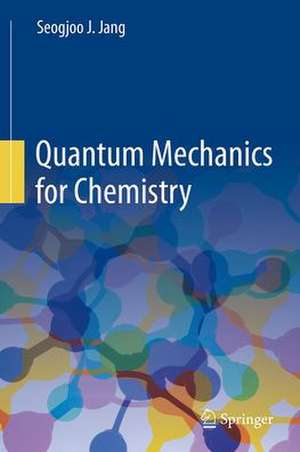Quantum Mechanics for Chemistry
Autor Seogjoo J. Jangen Limba Engleză Hardback – 29 iun 2023
| Toate formatele și edițiile | Preț | Express |
|---|---|---|
| Paperback (1) | 397.23 lei 3-5 săpt. | +29.43 lei 4-10 zile |
| Springer International Publishing – 29 iun 2024 | 397.23 lei 3-5 săpt. | +29.43 lei 4-10 zile |
| Hardback (1) | 654.43 lei 6-8 săpt. | |
| Springer International Publishing – 29 iun 2023 | 654.43 lei 6-8 săpt. |
Preț: 654.43 lei
Preț vechi: 769.92 lei
-15% Nou
Puncte Express: 982
Preț estimativ în valută:
125.23€ • 131.08$ • 104.23£
125.23€ • 131.08$ • 104.23£
Carte tipărită la comandă
Livrare economică 01-15 aprilie
Preluare comenzi: 021 569.72.76
Specificații
ISBN-13: 9783031302176
ISBN-10: 3031302176
Pagini: 432
Ilustrații: XVIII, 432 p. 27 illus., 21 illus. in color.
Dimensiuni: 155 x 235 x 32 mm
Greutate: 0.81 kg
Ediția:2023
Editura: Springer International Publishing
Colecția Springer
Locul publicării:Cham, Switzerland
ISBN-10: 3031302176
Pagini: 432
Ilustrații: XVIII, 432 p. 27 illus., 21 illus. in color.
Dimensiuni: 155 x 235 x 32 mm
Greutate: 0.81 kg
Ediția:2023
Editura: Springer International Publishing
Colecția Springer
Locul publicării:Cham, Switzerland
Cuprins
Chapter1: Concepts and Assumptions of Quantum Mechanics.- Chapter2: Dirac Notation and Principles of Quantum Mechanics.- Chapter3: Harmonic Oscillator and Vibrational Spectroscopy.- Chapter4: Multidimensional Systems and Separation of Variables.- Chapter5: Rotational States and Spectroscopy.- Chapter6: Hydrogen-like Systems and Spin Orbit States of an Electron.- Chapter7: Approximation Methods for Time Independent Schrödinger Equation.- Chapter8: Many Electron Systems and Atomic Spectroscopy.- Chapter9: Polyatomic Molecules and Molecular Spectroscopy.- Chapter10: Quantum Dynamics of Pure and Mixed States.- Chapter11: Theories for Electronic Structure Calculation of Polyatomic Molecules.- Chapter12: Special Topics.
Notă biografică
Seogjoo J. Jang is a Professor of Chemistry at Queens College of the City University of New York (CUNY), and is a doctoral faculty member of both the Chemistry and Physics PhD programs at the Graduate Center of CUNY. He obtained his BS (1989) and MS (1993) degrees in Chemistry from Seoul National University, and a Ph.D. degree (1999) in Chemistry from the University of Pennsylvania. He then worked as a postdoctoral associate at MIT (1999-2002) and as a Goldhaber Distinguished Fellow (2003-2005) at Brookhaven National Laboratory before starting his faculty position at Queens College, CUNY in 2005. His research expertise is in quantum dynamics theories and computational modeling. In particular, he has pioneered modern theories of resonance energy transfer that are now being incorporated into theoretical analyses of experimental data on complex molecular systems and has made key contributions to understanding the role of delocalized excitons in photosynthetic light harvesting complexes. He is a recipient of the National Science Foundation CAREER Award (2009) and the Camille Dreyfus Teacher Scholar Award (2010).
Textul de pe ultima copertă
This textbook forms the basis for an advanced undergraduate or graduate level quantum chemistry course, and can also serve as a reference for researchers in physical chemistry and chemical physics. In addition to the standard core topics such as principles of quantum mechanics, vibrational and rotational states, hydrogen-like molecules, perturbation theory, variational principles, and molecular orbital theories, this book also covers essential theories of electronic structure calculation, the primary methods for calculating quantum dynamics, and major spectroscopic techniques for quantum measurement. Plus, topics that are overlooked in conventional textbooks such as path integral formulation, open system quantum dynamics methods, and Green’s function approaches are addressed. This book helps readers grasp the essential quantum mechanical principles and results that serve as the foundation of modern chemistry and become knowledgeable in major methods of computational chemistry and spectroscopic experiments being conducted by present-day researchers. Dirac notation is used throughout, and right balance between comprehensiveness, rigor, and readability is achieved, ensuring that the book remains accessible while providing all the relevant details. Complete with exercises, this book is ideal for a course on quantum chemistry or as a self-study resource.
Caracteristici
Demystifies Dirac notation, helping students build a strong foundation in quantum mechanics Introduces often-neglected topics such as path integrals, open system quantum dynamics, and Green’s functions Provides an accessible guide to quantum theory without sacrificing rigor or completeness
